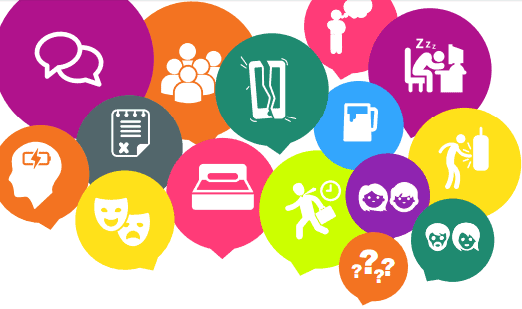Keys to a Healthier Mind

Mental wellness at every age
Mental disorder is no respecter of age, afflicting children and teens, adults and the elderlies. Unresolved mental disorders in children and teens often filter into adulthood, creating more intractable disabilities and impairments. Unresolved adult mental disorders often worsened in the senior years. Hence prompt recognition and intervention can minimise a lot of heartaches down the road.
The manifestation of mental disorders varies with age, e.g. anxiety and depression in children manifest differently in the young, adults and even the elderly. Similarly, there is no one-size-fits all treatment for the mental disorders even though the diagnoses are similar. The causes of mental disorder also vary at different times of our lives because each age group faces different challenges and stress from the environment. Learn and recognise some of the common mental conditions affecting children, adults and the aged as we seek expert insights from our psychiatrists from Raffles Counselling Centre.
Children & Teens Psychological conditions affect 1 in 10 children and can lead to emotional distress, academic problems and difficulties in socialising. For parents, the key to handling psychological disorders of children and teenagers is to recognise the problem early and seek professional help. By Dr Tan Hwee Sim, Specialist in Psychiatry and Consultant, Raffles Counselling Centre
Autism Spectrum Disorder
Autism encompasses previous diagnosis of autism and Asperger syndrome and is regarded as a brain disorder. It is characterised by social impairments, communication difficulties, and restricted and repetitive behaviour. Its signs and symptoms usually start to appear between one to two years of age and cannot be diagnosed at birth. Though children do not “outgrow” the illness the disabilities may lessen as the child develops and receives intervention.
Signs and Symptoms
- Difficulty with verbal
- Difficulty with non-verbal communication
- Difficulty with understanding, forming and sustaining relationship
- Unusual ways of playing with toys and other objects
Social Anxiety Disorder
Teens with Social Anxiety Disorder have an excessive fear of social and/or performance situations. They are overly concerned that they may do something embarrassing or humiliating and others will think badly of them. These teens constantly feel that they are “on stage,” which can lead to a great deal of self-consciousness. There are two categories of feared situations: performance-based and interaction-based.
Signs and Symptoms
- Excessive self-consciousness and anxiety
- Intense worry before a social situation
- Extreme fear of being watched or judged by others, especially people you don’t know
- Fear that you’ll act in ways that that will embarrass or humiliate yourself
ADHD
AHDH is a neurodevelopmental disorder marked by inattention, hyperactivity and difficulties controlling impulses. Seen in early childhood development, ADHD can be present by the age of 12 and the child will not able to perform at developmentally appropriate level. ADHD can cause impairment of major life activities and two-thirds of childhood ADHD continues to adulthood.
Signs and Symptoms
- Easily distracted
- Struggles to follow through instructions
- Difficulty organising tasks or activities
- Loses things
Stop Childhood Stress at its Track
Children face stress like adults but causes are different from adults and their manifestations is often reflected in physical symptoms as well as in their academic performance. Parents can help minimise stress for their young children by doing the following:
Stop overscheduling. With school and extra-curriculums, children need downtime to rejuvenate and they might not realise this by themselves. So knowing when children are overworking is important.
Allocate play time. Have activities that do not pressurise. There should be no lesson or competition to these games. Younger kids will do this naturally but older kids may forget how to simply play.
Ensure ample sleep. Sleep is paramount during their early years and having good sleep helps to minimise stress, boost mood and improve school performances.
Teach children to deal with mistake. Children’s stress often origins from the fear of making mistake. Emphasise that they are not supposed to know or do everything right and what is more important is how to recover from a mistake.
Adults Entering the workforce is arguably one of the most stressful events in any our life. Adulthood is the most productive phase of life; hence, being mentally healthy during this period is paramount because we are responsible for the next generation; we form the economic backbone of society etc. By Dr Lim Yun Chin, Specialist in Psychiatry and Consultant, Raffles Counselling Centre
Anxiety and Depression
Up to 12 per cent of adults face lifetime risk of developing Anxiety and Depressive Disorders. If untreated, they can be very incapacitating and distressing. The symptoms, particularly anxiety, are mainly somatic or physical resulting in multiple visits to their General Practitioners. Therefore vigilance is important in detecting the symptoms early so as to prevent further development of the disorder.
Signs and Symptoms
- Loss of motivation
- Thoughts of death and suicide
- Feelings of helplessness
Anger Management
Anger is a universal emotion. However, anger and hatred towards others leads to anger against ourselves, and can cause depression in the long run. Managing anger is critical for a healthy lifestyle because anger when out of control causes elevated blood pressure, increased pulse rate, a halt to digestion and other conditions. Anger not dealt with constructively can lead to depression.
Signs and Symptoms
- Constant irritability, rage and anxiety
- Punching objects to feel a sense of release (image: punch walls)
- Reacting quickly and violently to small problems
- Consistently having the same arguments with friends, relatives or colleagues
Obsessive Compulsive Disorder (OCD)
OCD is a type of anxiety disorder. OCD is characterised by distressing repetitive thoughts, impulses or images that are intense, frightening, absurd, or unusual. These thoughts are followed by ritualised actions that are usually bizarre and irrational. These ritual actions, known as compulsions, help reduce anxiety caused by the individual’s obsessive thoughts. Often described as the “disease of doubt” the sufferer usually knows the obsessive thoughts and compulsions are irrational but, on another level, fears they may be true.
Signs and Symptoms
- Order and symmetry; everything must line up “just right.”
- Superstitions; excessive attention to something considered lucky or unlucky
- Excessive double-checking of things, such as locks and switches
- Counting, tapping, repeating certain words to reduce anxiety
Stop Anxiety at its Tracks
Keep a journal. Rank your anxiety on a one-to-10 scale. Note the events during which you felt anxious and the thoughts going through your mind before and during the anxiety. Keep track of things that make you more anxious or less anxious.
Take time out for yourself every day. Even 20 minutes of relaxation or doing something pleasurable for yourself can be restorative and decrease your overall anxiety level.
Avoid unhealthy substance use. Alcohol and drug use and even caffeine or nicotine use can cause or worsen anxiety.
Seek for help early. Anxiety, like many other mental health conditions, can be harder to treat if you wait.
Elderly Did you know that common psychological conditions among the elderly, like dementia and depression, are often neglected or under-identified? By Dr Joshua Kua, Specialist in Psychiatry and Consultant, Raffles Counselling Centre
Dementia
Dementia describes a condition where there is progressive loss of global brain function beyond that which would be expected in normal ageing. The two most common causes of dementia in our population are Alzheimer’s disease as well as multiple strokes or vascular dementia. With dementia, memory, attention, language, abstract thought, problem solving and judgement can be impaired. In later stages, orientation to time, person and place is lost.
Signs and Symptoms
- Subtle short term memory change and confusion
- Difficulty following through storylines
- Difficulty finding the right word to say
- Difficulty with abstract reasoning or impaired judgement
- Changes in mood, e.g. depression
Delirium
Delirium is an abrupt disturbance in a person’s mental ability that causes mental confusion and decreased awareness of one’s environment. Individuals may find it difficult to sleep, think, remember things or pay attention. The onset of delirium is usually sudden, often within hours or a few days. Delirium is especially common among the elderly. It is treatable but some may not return to their baseline function. It can occur acutely or sub-acutely and its symptoms can fluctuate.
Signs and Symptoms
- Inability to stay focused on a topic
- Poor memory, especially recent events
- Seeing things that do not exist
- Disturbed sleep habits
Depression
In the elderly, depression often occurs with other medical illnesses and disabilities and lasts longer. There tend to be negative emotions that adversely impact people’s lives, causing social, educational, personal and family difficulties. People who are more prone to depression are those with physical health issues, experiences grieves and losses, worry a lot, have a history of prior episodes, a family history of depression or may be subjected to prolonged stressful situation without adequate relief.
Signs and Symptoms
- Feeling of worthlessness and persistent low mood or irritability
- Unexplained or aggravated pains and aches
- Loss of interest in socialising and hobbies
- Negative, pessimistic or suicidal thinking
Stop Depression at its Tracks
Stay active: Not only is physical activity good for your physical health, but it can also reduce depression and anxiety, and improve overall mood.
Stay connected: Maintaining a social life helps to keep the mind occupied and fulfilled. Social support is also important during life’s many challenges, particularly as you age.
Care for your physical health: Getting adequate sleep, regular physical exams, and having a healthy diet are important preventive steps for most health conditions including depression.
Plan ahead: Being prepared for life changes can help to create a sense of order and ease your mind about the uncertainties of the future. Planning how you will handle stress triggers, if they arise, will reduce anxiety and allow you to seek support should you need it.





